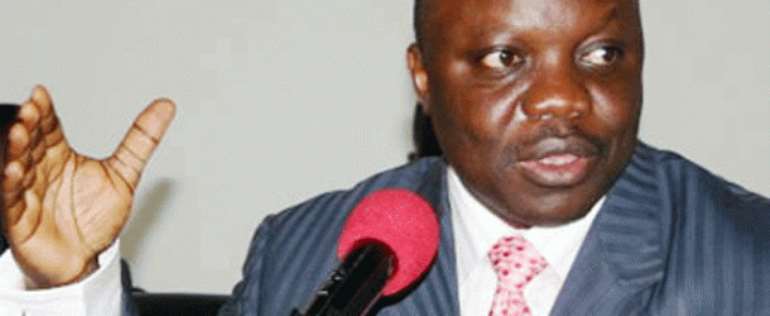Kwankwaso, Uduaghan Differ On PIB… The Bill Is 'Rubbish', Says Kwankwaso … It'll increase Nigeria's earnings- Uduaghan

Controversy stalking the Petroleum Industry Bill (PIB) continued at the weekend, with Governor Rabiu Musa Kwankwaso of Kano State describing the bill as 'rubbish.'
Likening the bill to the equally controversial Onshore-Offshore dichotomy, which he vehemently opposed before the National Assembly passed it; the governor said the bill was designed by the rich to take more from the poor.
Meaning that the oil-producing states, some of which get more revenue from the Federation Account, will swell their coffers with the 10 per cent earmarked for oil-producing communities under the PIB, to the exclusion of other states of the federation.
However, Governor Emmanuel Uduaghan of Delta State begs to differ, wondering why the long debate, and delay in passing the PIB.
'If the crude oil is in other parts of this country, the debate (over the PIB) will not be this long. Other people should show understanding,' he said.
According to Uduaghan: 'The 10 per cent to the host communities, as stated in the PIB, is not too much. I would have preferred 50 per cent to address squarely the developmental challenge.
'There are communities all over the world that have such funds, which sometimes are put in Trust, that are managed locally or internationally.
'People should be sympathetic with what is happening in the Niger Delta, because of the environmental damage. The people can no longer farm or fish, as a result of pollution and environmental degradation.'
This plea maybe falling on deaf ears, as Governor Kwankwaso stressed that the PIB would not go the way of the Onshore-Offshore dichotomy, whose passage, he alleged, was tainted with corrupt practices, on the part of northern legislators, in the National Assembly.
'When some us bared our minds on the issue (Onshore-Offshore dichotomy), so many people were not happy about it. It is like asking us to shut up,' he said.
'We believed that even in the offshore-onshore issue, money exchanged hands; there is no question about it; otherwise, there is nobody who would go and vote against his own interest if he doesn't have bigger interest,' he said.
Nonetheless, Kwankwaso said the offshore-onshore issue was not dead, revealing that, 'we (northern leaders have) told our people (in the National Assembly) that given the opportunity, they should raise it again for debate.'
He cautioned that it was unacceptable, and an abnormal situation to take 'money from the treasury to those who have got too much money'.
Kwankwaso also faulted the proposed review of the 1999 Constitution (as amended), saying, 'we don't need constitutional amendment in this time; what we need is constitutional enforcement. Our constitution is adequate.'
While labeling the National Assembly as a drain on the resources of the country, he alleged that members were embarking on the review of the constitution because of the pecuniary gains there from.
He said: 'The amendment that we need is good leadership and good governance. So, as far as we are concerned, constitution amendment is just a diversion, wastage of time and money and the National Assembly should be blamed for this because there is a lot of benefit for them in the exercise.'
On the issue of constituency projects, the governor said the legislators have constituted themselves into a parallel arm of the executive, thus competing with the president, governors and council chairmen in the execution of projects.
'What we have in the National Assembly is that today, only God - the Almighty Allah - can moderate what is happening there, as nobody else can do it,' he said.
'I say so because if you look at the budget of the Federal Government, which is one of the main functions of the National Assembly, what they do is when the president of the country brings budget, it includes what they called the constituency projects like roads, hospitals, and water projects for the legislators to execute.
'What this means is that they have constituted themselves into another executive arm of government competing with Mr. President, competing with the governors and even competing with the local government chairmen.
'A legislator has no business coming out of his constituency to construct roads and that is telling on the general performance of the Federal Government.' (Guardian)
